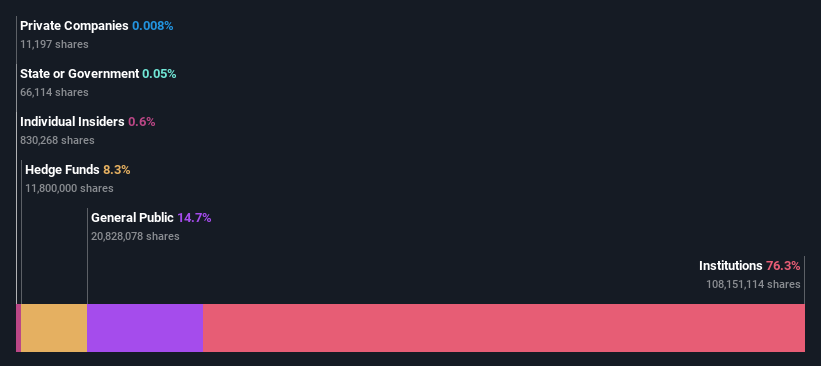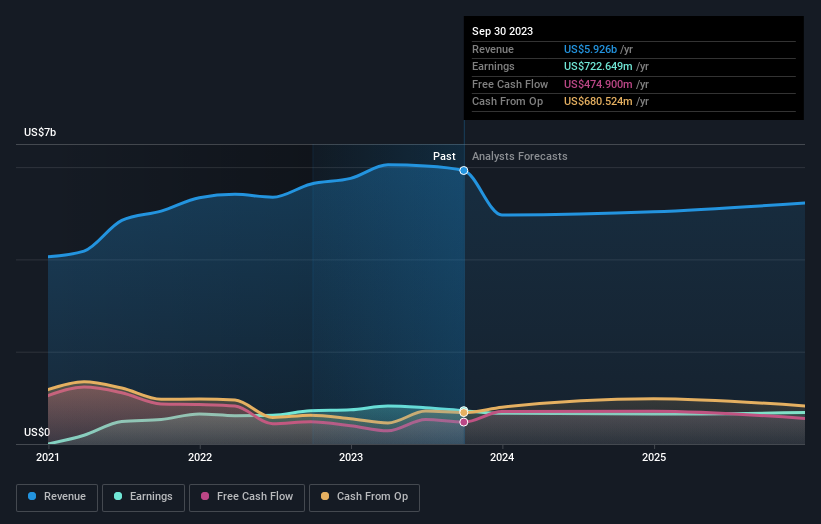- United States
- /
- Auto
- /
- NYSE:HOG
Harley-Davidson, Inc.'s (NYSE:HOG) latest 12% decline adds to one-year losses, institutional investors may consider drastic measures

Key Insights
- Significantly high institutional ownership implies Harley-Davidson's stock price is sensitive to their trading actions
- The top 9 shareholders own 51% of the company
- Recent purchases by insiders
Every investor in Harley-Davidson, Inc. (NYSE:HOG) should be aware of the most powerful shareholder groups. We can see that institutions own the lion's share in the company with 76% ownership. Put another way, the group faces the maximum upside potential (or downside risk).
And institutional investors saw their holdings value drop by 12% last week. Needless to say, the recent loss which further adds to the one-year loss to shareholders of 38% might not go down well especially with this category of shareholders. Institutions or "liquidity providers" control large sums of money and therefore, these types of investors usually have a lot of influence over stock price movements. As a result, if the decline continues, institutional investors may be pressured to sell Harley-Davidson which might hurt individual investors.
In the chart below, we zoom in on the different ownership groups of Harley-Davidson.
Check out our latest analysis for Harley-Davidson

What Does The Institutional Ownership Tell Us About Harley-Davidson?
Many institutions measure their performance against an index that approximates the local market. So they usually pay more attention to companies that are included in major indices.
Harley-Davidson already has institutions on the share registry. Indeed, they own a respectable stake in the company. This suggests some credibility amongst professional investors. But we can't rely on that fact alone since institutions make bad investments sometimes, just like everyone does. It is not uncommon to see a big share price drop if two large institutional investors try to sell out of a stock at the same time. So it is worth checking the past earnings trajectory of Harley-Davidson, (below). Of course, keep in mind that there are other factors to consider, too.

Investors should note that institutions actually own more than half the company, so they can collectively wield significant power. It looks like hedge funds own 8.3% of Harley-Davidson shares. That's interesting, because hedge funds can be quite active and activist. Many look for medium term catalysts that will drive the share price higher. The Vanguard Group, Inc. is currently the company's largest shareholder with 9.5% of shares outstanding. For context, the second largest shareholder holds about 8.3% of the shares outstanding, followed by an ownership of 8.2% by the third-largest shareholder.
We did some more digging and found that 9 of the top shareholders account for roughly 51% of the register, implying that along with larger shareholders, there are a few smaller shareholders, thereby balancing out each others interests somewhat.
Researching institutional ownership is a good way to gauge and filter a stock's expected performance. The same can be achieved by studying analyst sentiments. Quite a few analysts cover the stock, so you could look into forecast growth quite easily.
Insider Ownership Of Harley-Davidson
The definition of an insider can differ slightly between different countries, but members of the board of directors always count. The company management answer to the board and the latter should represent the interests of shareholders. Notably, sometimes top-level managers are on the board themselves.
Insider ownership is positive when it signals leadership are thinking like the true owners of the company. However, high insider ownership can also give immense power to a small group within the company. This can be negative in some circumstances.
Our data suggests that insiders own under 1% of Harley-Davidson, Inc. in their own names. It's a big company, so even a small proportional interest can create alignment between the board and shareholders. In this case insiders own US$22m worth of shares. Arguably, recent buying and selling is just as important to consider. You can click here to see if insiders have been buying or selling.
General Public Ownership
With a 15% ownership, the general public, mostly comprising of individual investors, have some degree of sway over Harley-Davidson. While this group can't necessarily call the shots, it can certainly have a real influence on how the company is run.
Next Steps:
While it is well worth considering the different groups that own a company, there are other factors that are even more important. Like risks, for instance. Every company has them, and we've spotted 2 warning signs for Harley-Davidson (of which 1 is concerning!) you should know about.
If you are like me, you may want to think about whether this company will grow or shrink. Luckily, you can check this free report showing analyst forecasts for its future.
NB: Figures in this article are calculated using data from the last twelve months, which refer to the 12-month period ending on the last date of the month the financial statement is dated. This may not be consistent with full year annual report figures.
Valuation is complex, but we're here to simplify it.
Discover if Harley-Davidson might be undervalued or overvalued with our detailed analysis, featuring fair value estimates, potential risks, dividends, insider trades, and its financial condition.
Access Free AnalysisHave feedback on this article? Concerned about the content? Get in touch with us directly. Alternatively, email editorial-team (at) simplywallst.com.
This article by Simply Wall St is general in nature. We provide commentary based on historical data and analyst forecasts only using an unbiased methodology and our articles are not intended to be financial advice. It does not constitute a recommendation to buy or sell any stock, and does not take account of your objectives, or your financial situation. We aim to bring you long-term focused analysis driven by fundamental data. Note that our analysis may not factor in the latest price-sensitive company announcements or qualitative material. Simply Wall St has no position in any stocks mentioned.
About NYSE:HOG
Harley-Davidson
Manufactures and sells motorcycles in the United States and internationally.
Undervalued with adequate balance sheet.


